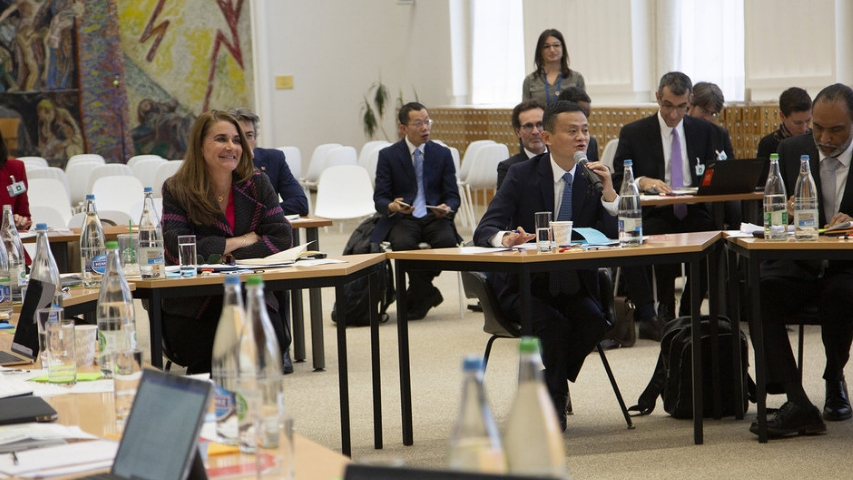
Melinda Gates and Jack Ma lead UN Panel to discuss the risks and benefits of the Digital Age
by Shruthi Venkatesh February 6 2019, 5:59 pm Estimated Reading Time: 4 mins, 46 secsThe UN chief António Guterres called for a key discussion with the global decision-makers and influencers to highlight the growing risk of international cyber-attacks while promoting the advantages of digital technology. The meet held at the UN in Geneva last month, focused of implementing “bold, innovative ideas” to reflect on the risks and benefits of the current digital age. Gutteres along with the UN panel of experts led by philanthropist Melinda Gates and Alibaba founder Jack Ma called this as the ‘Fourth Industrial Revolution’.
Having a 70 year old history, the UN panel consists of only 20 heads till now which marks its ‘rarity’. The panel includes US internet pioneer Vint Cerf, and South Korea-based digital marketing mastermind Sophie Eom who come as a huge support in favour with the industry and the private sector, as well as governments, academia, civil society and inter-governmental organizations. “This is truly an exciting and critical moment,” Mr Cerf said. “We just marked the 70th anniversary of the Universal Declaration of Human Rights, and 50 per cent of the world is now online. Today, we are challenged to induce responsible behaviour in the digital age.”
Anoush Tatevosian, a spokesperson told that the panel’s mission is to focus and hear from all the four corners of the globe and to understand the priorities and ideas of UN Member States, private sector companies, civil society organisations, academia and tech communities. “It’s not just about artificial intelligence, data privacy or internet governance, it’s about the intersection of these things,” she explained. “The problem today is that these issues are often discussed in their separate corners.”
In regard to this, an online call was implemented for contributions which were open till the 31st of January. It has now already yielded up to 100 written submissions from 33 countries. UN News reports that the panel has met more than 2,000 individuals and convened seven virtual discussion groups on topics such as inclusive development, data, human rights and human agency, along with digital trust and security. In addition to visiting US Silicon Valley and technology hubs in China, Israel and India, members have also met policymakers in Paris, Beijing, Brussels, Berlin, Washington, Delhi and Astana and participated in digital policy events including the Web Summit, the Raisina Dialogue in India, and Africa e-Commerce Week.

UN digital tech panel to come up with 'bold, innovative ideas' (UN News)
After the first General Assembly resolution in 1998, the Global Commission on the Stability of Cyberspace heard that the global debate around international security and information and communications technology (ICT) had evolved into a wider discussion about development and human rights in the current meeting held in Geneva. Renata Dwan, Director of UNIDIR, the UN Institute for Disarmament Research says “what we’ve seen is really the discussion around what cyber-stability means and for whom it means something, really expand” after being a member of the agenda for decades. “We’ve seen the debate that started about State behaviour and responsible State behaviour has really become a much wider discussion about the role of the private sector, the role of communities, of regions, of cities, and indeed of individuals – and how to develop space for rights, for equity, for development and for access that enhances development of all”, she added.
“After years of unbridled optimism - justified optimism - surrounding the development of digital technologies of cyberspace, we now have come to the sober realization that those positive developments carry downsides,” says Mr. Hochschild UN Assistant Secretary-General for Strategic Coordination, explaining that initial hopes for digital technology had given way to a more cautious assessment. He added: “We’re at the point of asking ourselves, ‘will emerging technologies contribute to peace overall or will they undermine it? Will they generally further access to sustainable development or will they further inequality? Will they facilitate respect for human rights or will they provide new tools to those who wish to contain or violate the realization of human rights?’”
These questions made the secretary – general’s belief more challenging that the digital age is one of the major issues faced in the current generation. “Next to climate change, next to dealing with inequality,” Mr. Hochschild said, before noting the “absence” of international mechanisms that could prevent digital flashpoints from escalating. “Some 30 States have the capacity to defend themselves and those capacities are daily being built up”, he explained. “But where does that leave the other 163 countries that don’t have such a capacity, or the financial means, or political means to defend themselves?”
The UN officials later noted that among all the challenges faced; the lack of internet access in the world’s poorest countries comes as the primary source, where fewer than one in five people has regular electricity - and addressing a large and growing digital gender gap. “In 2019 it is shocking that the number of women who access the internet is 10 per cent lower than men,” Mr. Hochschild said. “In developed countries it’s 33 per cent lower, and the worst thing is, those statistics are getting worse, not better.”
Yet, the main focus for a good sustainable development must be on people. As the world is updated with good digital technology, the people must also stay updated with the new technologies and innovations of time. Only then, could the world could meet its so called ‘bold, innovative ideas’ as planned by the agendas.




-173X130.jpg)
-173X130.jpg)
-173X130.jpg)

-173X130.jpg)
-173X130.jpg)

